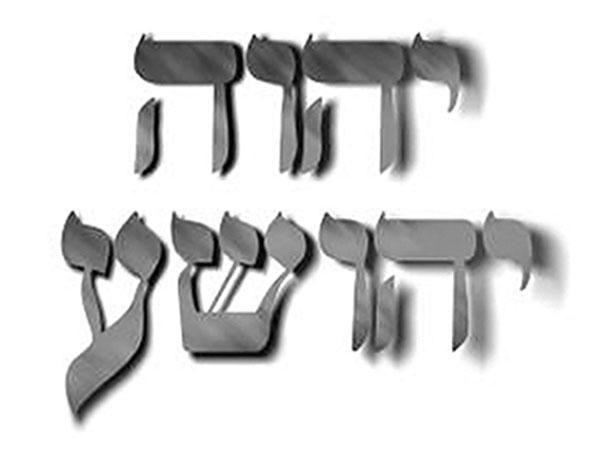What is the Name Above All Names?
Jan 14, 2021
What is the name above all names? Is it a Greek or a Jewish name? Doesn’t a disciple of His have the right to know the very name and pronunciation given by the angel Gabriel (Luke 1:31), when he brought such good news to the virgin Miriam (Mary)?
Or when the Master spoke His name from heaven to Paul on the road to Damascus, what name did He use, since Paul said that he heard an utterance from His mouth? “And when we had all fallen to the ground, I heard a voice saying to me in the Hebrew dialect, ‘Saul, Saul, why are you persecuting Me? It is hard for you to kick against the goads.’ And I said, ‘Who are You, Lord?’ And the Lord said, ‘I am Jesus whom you are persecuting’” (Acts 22:14; 26:14-15). Surely the apostle Paul was not puzzled over language when told “Arise, and be baptized, and wash away your sins, calling on His name” (Acts 22:16).
What then was the utterance of His mouth that proclaimed His name, since He spoke in Hebrew? Many names are promoted these days: Y’Shua, Yeshua, Yahshua, Joshua, Yehoshua. Shouldn’t we be able to know His name? “And there is salvation in no one else, for there is no other name under heaven given among men, by which we must be saved” (Acts 4:12). Should not a man be called by the same name all over the world?
Who is Iesous?
Hundreds of times in the New Testament the Greek name Iesous is translated as Jesus. But if you have ever read an older King James Bible you might have noticed something odd in Acts 7:45. In his speech to the Jewish council, Stephen refers to the man who led Israel into the Promised Land as Jesus, not Joshua! Is this an error?
Well, yes and no, since the Greek name in verse 45 is Iesous, the same word translated as Jesus everywhere else. But Stephen could not possibly have been referring to anyone else but the leader Joshua who took over after Moses. For immediately afterwards, in verse 59, Stephen cried out when being stoned, “Lord Jesus, receive my spirit!” Again the name is Iesous in the Greek. Was Stephen crying out to the historical figure Joshua, long dead, to save him, or was he calling upon the Son of God, since both names in the Greek are Iesous? So what does Iesous mean, Jesus or Joshua? Was Stephen, a man so righteous that heaven opened up at his martyrdom, was he so overcome by the stress of the moment that he couldn’t tell a long-dead forefather from the Messiah seated upon His throne?
Jesus or Joshua?
Modern translations of the Scriptures, and even recent revisions of the King James version, have noticed this contradiction and changed the name in Acts 7:45 to Joshua so that it makes sense. (The same problem is found in Hebrews 4:8 also.) But where did these translators get their authority to change the Scriptures? Is it through integrity and honesty that Iesous is translated Jesus, except when it obviously has to mean Joshua? Or are the traditions of men so strong that translators can take liberties with the Word of God?
At least the translators of the original King James Version were consistent enough to translate Iesous as Jesus in Acts 7 even when it made no sense.
So if the new translations change Jesus to Joshua in Acts 7:45 and Hebrews 4:8, why didn’t they also change Jesus to Joshua in all the other Scriptures where they found the name Iesous? In Acts 7:45 the name Iesous is obviously Joshua, and could not possibly refer to anyone else. Isn’t the name Iesous really Joshua everywhere it is found? Isn’t His name really Joshua instead of Jesus? If it would be tampering with the Scriptures to change Jesus the Savior’s name back to Joshua, would it not also be tampering with the Scriptures to change Jesus back to Joshua in Acts 7 and Hebrews 4? It’s all the same word — Iesous! We want to know God’s mind about these things, because it doesn’t make sense that the translators would change the Holy Scriptures in one place and not the other. Not wishing to disturb tradition, do they hang onto the name Jesus for the sake of selling Bibles? For certain, one thing is true. Miriam and Yoseph (Mary and Joseph in English) named the child just as the angel commanded them. Would the angel speak to them in Hebrew or did he speak Greek? Everything would be more understandable if he spoke Greek to them. Then Jesus was exactly what came out of his mouth and we today pronounce His name exactly as the angel did. Except that there is no “J” sound in Greek ... or Hebrew ... or even English until the 1500’s.
What a pickle! Why is there so much confusion surrounding the name by which all men must be saved? Should not God reveal to His followers the name above all names to whom every knee shall bow and every tongue confess? Will all His people gather around His throne someday and mumble all these distorted sounds as if we were gathered around the tower of Babel? Are we not speaking of the God who longs to speak to the human heart, to save all men who call upon ... what name?
What His Name Means
Does the name of the Son of God have any meaning other than as a label? It certainly did to Yoseph: “And you will name Him Jesus, because he will save his people from their sins” (Matthew 1:21, New Century Version). If His name is Jesus, this Scripture makes no sense, since obviously the Name of the Messiah means that He will save His people from their sins. But do you know what the name Jesus literally means? No you don’t, and neither does anyone else, because it has no meaning as a word in any language. It is, at best, a mere tag.
We might take a mere tag somewhat lightly, but not the Jews. When Yoseph and Miriam brought the child to the Temple in Jerusalem to dedicate Him, they dared not even utter such a name as Iesous. The Jewish priests jealously guarded the holiness of the Temple, and considered Greek to be a loathsome language. If Yoseph and Miriam had dedicated their Child in a Greek name it would have been viewed as an abomination, and they would have been roughly ejected from the Temple! Obviously, this did not happen, and they performed everything according to the Law (Luke 2:21-39).
But if the Greek Iesous really is Joshua in Hebrew, the language that Yoseph, Miriam, and every other Jew spoke including the Savior Himself, then the angel’s proclamation makes total sense. Hebrew names in the Bible are always meaningful, and the name Joshua is even more than that. It is prophetic.
In John 17:11 our Master prayed “Holy Father, keep them in Your name, the name which You have given Me, that they may be one, even as we are.” Since according to the words of the Savior, the Father’s name is in His name, it will help to know the Father’s name.
Fortunately this is pretty easy, because the Old Testament was only written in Hebrew and a number of verses are very clear in proclaiming the Father’s name, such as “Sing to God ... whose name is Yah” (Ps 68:4). Also the Scriptures are full of the expression Hallelujah, a phrase very familiar to Christians, but do you know what it means in Hebrew? It is actually Hallelu Yah, a command meaning “Give praise to Yah.” None of this is secret stuff, for it is found in the marginal readings of many Bibles today; for example, look at Psalms 116:19 in the New American Standard Bible.
So how do you say the Savior’s name in His language? Well, it would be Joshua, except that the letter “J” in English was originally a “Y” sound. So His name, which has His Father’s name in it, is Yahshua. And it has such a wonderful meaning that both Yoseph and Miriam marveled over it, because they knew full well their native language. It means Yah (translated “I Am”, Exodus 3:14) Shua (“mighty and powerful to save”). So when the angel told this name to them, they were astounded, for His name was a declaration from the God of heaven to mankind that there had come a man who would be mighty and powerful to save; “And you shall call His name Yahshua, for it is He who will save His people from their sins” (Matthew 1:21). Now this scripture makes total sense.
The Weight of Tradition
But does it really matter to God what name we call Him? It certainly was important enough for the Savior to cry out during the last hours before He was betrayed, “Holy Father, keep them in Your name, the name which You have given Me” (John 17:11).
And as stated before, it was clear to the Jews what that name was and how to pronounce it. Hallelujah is a universal expression, and Yah is the universal name of God. Yet so great is the weight of tradition that men have been blindly clinging to a name that has no meaning and makes the Scriptures mentioned have no meaning, either. Can anyone possibly maintain that the name of the Father is somehow incorporated into the name Jesus, or that the name Jesus means that He will save His people from their sins?
So we can see that His true name is in need of restoration based on honest scholarship and historical evidence. Acts 3:21 states that all things must be restored and made ready for His second coming, so this must surely include His name, too. And if something so essential and so fundamental as His name needs to be restored, what else might need to be restored, too?
Unity
Many in Christianity today do not feel that it is essential to know the name given to the Savior through the mouth of angels. Perhaps they have been taught that it is best to leave such matters in the hands of scholars, thinking that it is too difficult a matter for us so-called laymen, and besides we all have better things to do than wrangle over words and definitions. Not only that, many prominent Christians today believe that it is no longer possible to be one as the Savior prayed, that the answer to His prayer must wait for the next age or in heaven somewhere. But is this the Word of God, or mere human reasoning to justify the sin so outstanding in Christianity today? The angel told Yoseph and Miriam to call Him Yahshua “...for it is He who will save His people from their sins.” Is lack of unity a serious enough thing to be called sin? Is there enough power in His name to save us from all sin, even such a powerful sin as disunity?
Power in His Name
It was certainly a serious enough matter for the Master to labor over as He prayed on the night He was betrayed. And this is what was gushing from His heart: “Holy Father, keep them in Your name, the name which You have given Me, that they may be one, even as We are” (John 17:11). Isn’t it plain that being in His name means being in unity?
It becomes even clearer as He continues,
...that they may all be one; even as You, Father, are in Me, and I in You, that they also may be in Us; that the world may believe that You sent Me. And the glory which You have given Me I have given to them; that they may be one, just as We are one; I in them, and You in Me, that they may be perfected in unity, that the world may know that You sent Me, and loved them, even as You loved Me.” (John 17:21-23)
Did the Son of God think there was enough power available in His name to bring about unity among His followers? Or was He, like so many in Christianity, only indulging in wishful thinking?
Unity made all the difference in the early days of the church, yet it has fallen into disrepute. It does not seem important anymore about the unity of the church or about His name. Everyone is satisfied in his own denomination, his own paneled house as it says in Haggai 1:4. Oneness is obscure these days; it is held in a state of low esteem. It is obscure because it is hidden. It is hidden because the prophetic light has not shined upon it, therefore it has remained shrouded in the darkness. It is not clearly seen or understood.
But who today can shed light upon it since each comes from his own sect or denomination, which no one will admit is a division? Because of this, unity is not held high as the meaning of our existence as followers of Messiah, those endowed with the Holy Spirit, the Spirit who is one without any division or barriers. “There is neither Jew or Greek, there is neither slave nor free man, there is neither male nor female; for you are all one in Christ Jesus” (Galatians 3:28).
If God’s word is true, how can His children be divided by race, temperament, educational level, wealth, or even political party affiliation? Are these not the deeds of the flesh condemned in Galatians 5:20 (“...disputes, dissensions, factions”)? Paul clearly stated in the next verse that those who practice such things will definitely not inherit the Kingdom of God.
A Cure for Division
Are not God’s people made one through the blood and Spirit of Messiah? The obvious lack of unity in Christianity today is the evidence of a lack of prophetic light. And for sure, no prophecy can come forth from darkness — from any sect or denomination. If “prophetic” utterance came forth from anyone who is part of a Christian denomination, whether Catholic, Protestant, or Greek Orthodox, it would be by an act of the human will. Only man moved by the Holy Spirit, in whom there is no division, speaks from God (2 Peter 2:21).
The fruit of disunity can only be bad fruit, the work of false prophets, self-seeking men. The Master said, “Beware of the false prophets!” (Matthew 7:15-20). Satan cannot cast out Satan, can he? In the same way, no one who prophesies from division is able to cure division. Therefore, the call to unity must come from outside the camp (Hebrews 13:12-13).
But when those in denominations hear about unity, oneness, and John 17:21, they try harder to be one with their brothers and sisters on Sunday morning or with their family. They become more friendly with each other for awhile. They try to work out a way in their busy schedule to visit a fellow church member and help them in some way or other. It doesn’t even spill over to those in the other denominations. Yet John 17:21 says explicitly “that they may all be one...”, not just members of your own denomination. “Well, it’s got to start somewhere!” is the excuse offered.
If the world is to believe that the Father sent the Son, then it must see a unity among the brothers that is truly unusual, for it is only among such a people that God has commanded the blessing of eternal life (Psalms 133:1-3). After nearly two thousand years, can a bitterly divided world see an extraordinary unity in the Christian church today?
Perhaps the question is better put this way: what does it mean to be in His name, the name above all names? His name has to do with the glory and radiance of His nature and character. His name reveals all that He is, and is what we must call upon to be saved. It is not some magical incantation to be uttered apart from the reality of His life, a life of unity and oneness. To call upon His name means to be saved from the division and strife of the world around us.
So where can we find the salvation spoken about by the angel that came to Yoseph and Miriam? Where are the people that are His people, the ones being saved from the sin of division and all the evil that comes with it? Where is the One who is “mighty and powerful to save”? And where can we find the undivided people who call upon the name of Yahshua? Where, oh where, can such a people be found?





